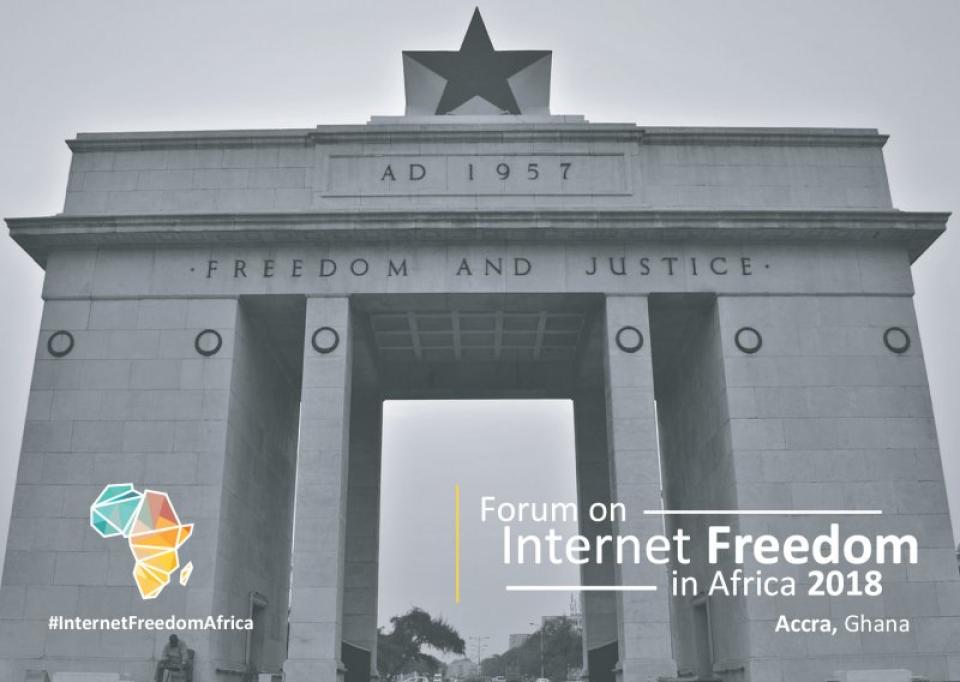
Forum for internet freedom, Africa - FIF Africa 2018 Poster
Since 2014, the Collaboration on International ICT Policy for East and Southern Africa (CIPESA), a Ugandan-based think tank has been convening the Forum on Internet Freedom in Africa (FIFAfrica) in collaboration with other partners. This year, in collaboration with the Media Foundation for West Africa (MWFA), participants from different parts of the continent and beyond were brought together to Accra, Ghana.
From the beautiful shores of the Atlantic Ocean at La Palm Royal beach hotel the two-day forum was conducted after several pre-event workshops and meetings. The event convened nearly 300 participants from over 45 different countries.
The event convened nearly 300 participants from over 45 different countries.
UPROAR Training Workshop
CIPESA in collaboration with Small Media held the UPRoar training which converged participants from Ethiopia, Gambia, Ghana, Kenya, Malawi, Namibia, Nigeria, Senegal, Tanzania, Uganda and Zimbabwe to deliberate on the Universal Periodic Review(UPR) mechanism as a means to foster freedom of expression particularly online. During this training, participants had the opportunity to understand how, through recommendations to the United Nations (UN) on human rights, the UPR process could complement the advocacy and implementation of digital rights in Africa. In their various capacities, participants explored opportunities for complementary advocacy efforts and stakeholder engagement to hold governments accountable for their human rights records–both online and offline.
From a gender perspective, the UPR mechanism has provided a platform for the advancement of inclusivity, empowerment and equality for women. For example in the last three cycles, a total of 3,078 recommendations out of 3,540 recommendations were made to the African states regarding women’s rights and these were then addressed or supported by the African states. However, only a few of the 3,540 recommendations touched on women’s rights online. As a powerful mechanism that is helping to put forward human rights concerns and foster accountability, it is imperative that women’s rights activists and practitioners utilise the UPR to advocate and call for policies and legislation for a safer internet space for women.
In the last three cycles of the UPR, a total of 3,078 recommendations out of 3,540 recommendations were made to the African states regarding women’s rights and these were then addressed or supported by the African states.
FIFAfrica
In their opening remarks, CIPESA’s executive director Dr.Wairagala Wakabi and his counterpart from MFWA -Sulemana Braimah highlighted the trends and challenges in internet freedom within the African continent and why collaboration is key to pushing back.
This was followed by a keynote speech from Charles Onyango-Obbo of Africapedia who touched on the concept of “digitocracy” and the reason why governments in Africa hate the internet. He said that the lack of “internet amnesia” brought into the open the weaknesses and wrong doings of leaders on various occasions causing the “big men” to be in fear of the power and potential of the internet to lead to revolutions, that are not necessarily armed but online. He concluded his speech by urging the participants to press on with the struggles and “get on your keyboards and fight!”
In as far as the gender digital divide and equal access to spaces online, the opening remarks and the keynote address were a call to all women out there. There has never been a time when the online sphere, though itself in jeopardy, has offered a bigger platform to get the message out there on women's rights, both offline and online. The “keyboard fight” therefore does not involve a handful of people nor does it segregate in any form. It simply urges that both men and women need to utilise the internet widely without fear and inhibition. This requires us to be more vocal and aggressive to put across the thoughts that matter most – to shape the internet we want, and the values we seek, both offline and online.
This requires us to be more vocal and aggressive to put across the thoughts that matter most – to shape the internet we want, and the values we seek, both offline and online.
Advancing Advocacy and Research on Gender-Based Violence Online in Africa
Different sessions were running in parallel, and in the main hall there was an interesting session on online gender-based violence based on experiences from different parts of Africa. The session emphasized the use of social media to harass and victimise women online as well as other issues such as identity theft, inadequate legal protections etc. Furthermore, there are limited avenues for support for women who have been abused online that addresses their trauma. Women in political positions were highlighted among the most vulnerable, and hence subject to greater criticism, harassment and abuse online.
Women in political positions were highlighted among the most vulnerable, and hence subject to greater criticism, harassment and abuse online.
In an example from Egypt, a participant shared a story of a friend, who turned down a marriage proposal, and then her picture and phone number were shared online, indicating that she was a prostitute. The process of getting the content taken down was described as long and tedious. Others explained and expounded on “revenge porn” and the illegal use of images to blackmail women and how such pictures go viral without due regard to the mental status of the victims.
Another key point explored was the role of social media platforms in countering gender-based violence online. Several women shared cases that they had reported to Facebook regarding harassment. However it was noted that most women often don’t report violations, opting instead to block and unfriend the perpetrator. The procedures and processes of reporting a violation on social media were regarded as too technical and not user-friendly. It was recommended that the procedures of reporting be made a little more convenient for all levels of users. Furthermore, given that the online world is a reflection of the offline world, a call was made for replication and coordination of efforts against gender-based violence, offline and online.
It was recommended that the procedures of reporting of violations on social media be made a little more convenient for all levels of users.
(Re) Setting the online narrative on Africa
This panel explored the need to “decolonize the internet” and to have more relevant and contextual content online. The question of who is creating and who is consuming the content and the gaps between these groups or people troubled many. The panel touched on the need to have content in local languages so as to encourage more people to get online. There needs to be diversity of content and preservation for future generations. Participants expounded on the use of audio, video and other multimedia means to ensure that content is not only in the form of text and is understandable to the community it serves.
Participants expounded on the use of audio, video and other multimedia means to ensure that content is not only in the form of text and is understandable to the community it serves.
It was noted that on Wikipedia there was less content on and by women, showing a gender gap in information.
Conclusion
As Africa takes strides in access and the use of the internet and the concept of internet freedom takes shape, it is crucial to ensure that perspectives of a free, accessible and open internet reflect gender equity. In the quest to bridge the digital divide it is essential that women now more than ever engage in the struggle to have equal opportunities and freedoms online as they do offline. More women should engage in inclusive forums such as FIFAfrica so as to learn, share and grow networks towards an inclusive cyberspace where policies, technology as well as content promotes women’s participation and rights online. I would urge all women and interested parties, as Charles Onyango-Obbo said–“Get on your keyboards and fight”.
Get on your keyboards and fight!
Responses to this post
Nice Article. Very informative and educative.
- Add new comment
- 4139 views






Add new comment